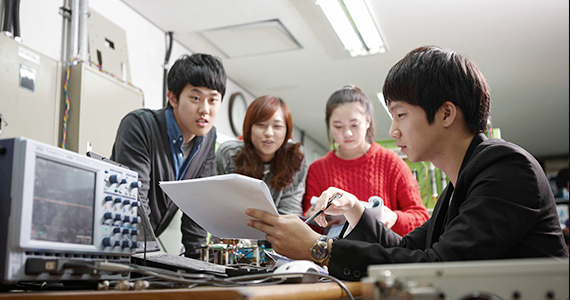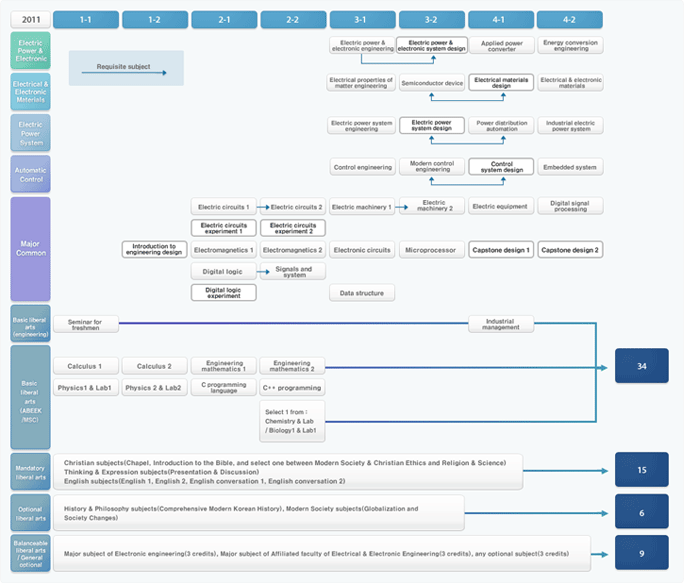Department of Electrical Engineering
Department of Electrical Engineering in Myongji University, is fostering the talent who understand, analyze and synthesize engineering theory major related, and who can creatively use it for experiment, design practice and production.
| Tel | 031-330-6971 |
|---|---|
| Fax | 031-330-6977 |
| Location | Engineering Building3 |

Introduction and Characteristics
It can be said that the settlement of the human society and the rapid cultural progress has made with the use of electrical energy, and the dependence on electricity of modern civilization has become increasingly intensified. Electricity in the electrical engineering is treated in two ways: as a source of energy and as a medium for delivering information. To stably produce, transmit and apply the double-meaning electricity, the department is studying the electric power systems, power electronics, electric and electronic materials, semiconductors, control systems, robotics, and other related fields of research. Since the establishment of the University, the department has educated professional technicians whose skills and creativeness meets the needs of today’s age by combining complete study of theory and experiment and practical training linked with the industrial site, and is admitted as the best in the field of electrical engineering, attracting the National Engineering Research Center of Excellence (Next Generation Power Technology Research Center). The course is broken down into step-by-step curriculums, and in step 1 (Freshman and sophomore classes) courses include the basic theory of electrical engineering and the literacy to be a high-quality professional technician. In step 2 (junior and senior classes) researches intensively in majors like power systems, power electronics, electric and electronic materials, control and automation systems. Lectures and experiments in parallel promote understanding and creativeness, as well as field works and projects cultivate practical problem-solving skills and social adaptability.
Mission Statement
In order to educate engineers about the information and knowledge-based society of 21st century, the College of Engineering consists of ten departments – Electrical Engineering, Electronic Engineering, Chemical Engineering, Advance Material Engineering, Environmental Biotechnology, Computer Engineering, Civil and Environmental Engineering Information Engineering, Communication Engineering, Transportation Engineering, Mechanical Engineering and Industrial Management, and is conducting practical and professional education which is required in the industrial site. In addition, the brilliant research achievements of the professors of the Faculty of Engineering have contributed significantly to raise the profile of the Myongji University. The college is continuously striving to innovate the engineering education to meet the international standards by establishing the Innovation Center for Engineering Education.
Establishment of the Basis
Understanding of engineering perspectives on various issues such as industrial economy, social culture, and natural environment
- I-Ⅰ. Ability to understand mathematics and basic scientific knowledge
- I-II. Ability to apply mathematics and basic scientific knowledge to solve engineering problems
Major
Understand, analyze and synthesize engineering theories, associated with the major, and develop the capabilities to apply them creatively to experiments, design practice and production
- II-Ⅰ. Ability to solve problems using the basic principles of electrical engineering
- II-II. Ability to analyze the problem and apply it to the problem environment by learning the characteristics and usage of the experimental equipment
Practical Major
Understanding electrical engineering related technology and familiarizing analysis methods and use of design tools, to cultivate engineering skills to develop the technologies and products required by society
- Ⅲ-Ⅰ. To cultivate the ability the understanding of electrical engineering related technology and Familiarizing analysis methods and use of design tools
- III -II. Capability to solve generated problems equipped with engineering skills to develop technology and products required by society.
Lifelong Education
To foster the ability to accept new knowledge and technology in the domestic and abroad electric technology field with open minded attitude, and sustained self-development ability
- IV-I. Based on smooth communication, cooperation ability as well as leadership, ability to understand the impact of electrical technology on society, the economy and ethics
- Ⅳ-Ⅱ. Ability to self-develop with a spirit of continuous exploration of new technologies
History
| 2019.02. | Currently) Bachelor degree(4,726), Master degree(488), Doctor degree(79) |
|---|---|
| 2016.03. | Changed to department of Electrical Engineering from the department of Electrical and Electronics Information & Communication Engineering. |
| 2006.03. | Divided into department of Electrical Engineering |
| 2002.03. | Changed to Affiliated Faculty of Electrical & Electronic Engineering. (department of Electrical Engineering) |
| 1998.11. | The Faculty of Electrical Control & Measurement Engineering was renamed to the Faculty of Electrical Information Control Engineering |
| 1997.11. | The Faculty of Electrical & Electronic Engineering was divided into the Faculty of Electrical Control & Measurement Engineering and the Faculty of Electronic Information & Telecommunication Engineering |
| 1995.03. | department of Electrical Engineering, department of Electronic Engineering, department of Control and Measurement Engineering, department of Information & Telecommunication Engineering were integrated into the Faculty of Electrical & Electronic Engineering. |
| 1984.03. | Myongji College was raised to Myongji University. |
| 1982.02. | Initiation general meeting for department of Electric Engineering was held. |
| 1980.09. | Seoul Campus was moved and integrated into YongIn Campus. |
| 1978.10. | department of Electrical Engineering was established in YongIn Campus. |
| 1974.01. | Doctor’s course was established in graduate school. |
| 1970.03. | Master’s course was established in graduate school. |
| 1963.12. | Myongji College was established. department of Electrical Engineering was established in Myongji College. |
| 1962.02. | Department of Electrical Engineering was established in Seoul College of Liberal Arts and Science |
Course Guideline
Curriculum
Credits (Applied after 18)
Engineering accreditation credits (Advanced Courses)
| Specialty Liberal Arts | MSC | Major(Design) | Free Option | Total |
|---|---|---|---|---|
| 21 | 30/32 | 70(12) | - | 134 |
Non-accreditation Credits (Ordinary Courses)
| Common Liberal Arts | Essential Liberal Arts | Basic Liberal Arts | General Liberal Arts | Major | General Optional | Total |
|---|---|---|---|---|---|---|
| 17 | 12 | 15 | 10 | 70 | 10 | 134 |
Specialty Liberal Arts and MSC(Advanced Courses),
| Specialty Liberal Arts | MSC |
|---|---|
|
|
Students who have excellent grades in English according to level class at Bangmok College of General Education, will take English 3/4 instead of English 1/2 and English Conversation 3/4 instead English Conversation 1/2.

